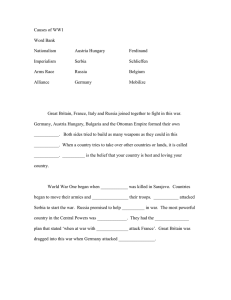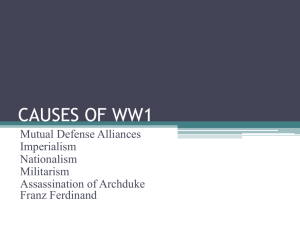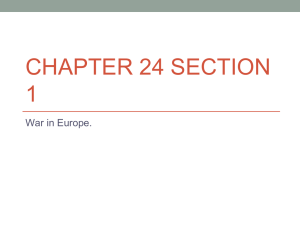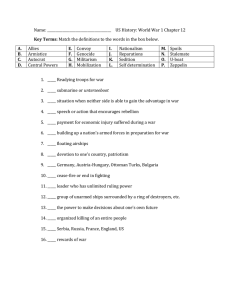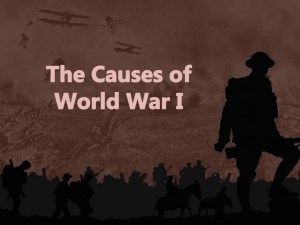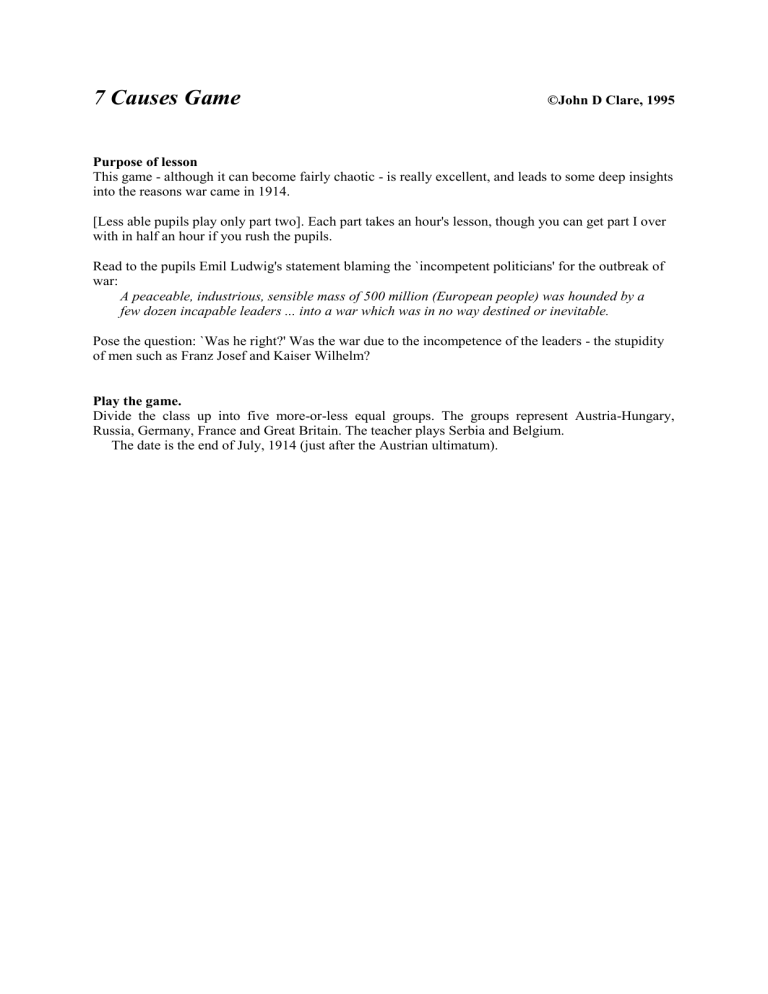
7 Causes Game
©John D Clare, 1995
Purpose of lesson
This game - although it can become fairly chaotic - is really excellent, and leads to some deep insights into the reasons war came in 1914.
[Less able pupils play only part two]. Each part takes an hour's lesson, though you can get part I over with in half an hour if you rush the pupils.
Read to the pupils Emil Ludwig's statement blaming the `incompetent politicians' for the outbreak of war:
A peaceable, industrious, sensible mass of 500 million (European people) was hounded by a few dozen incapable leaders ... into a war which was in no way destined or inevitable.
Pose the question: `Was he right?' Was the war due to the incompetence of the leaders - the stupidity of men such as Franz Josef and Kaiser Wilhelm?
Play the game.
Divide the class up into five more-or-less equal groups. The groups represent Austria-Hungary,
Russia, Germany, France and Great Britain. The teacher plays Serbia and Belgium.
The date is the end of July, 1914 (just after the Austrian ultimatum).
PART I
Most able pupils only.
Give each country a copy of the map (CF8) and the relevant country factsheet (CF9i-iii).
Make available to pupils any textbooks/ book box that you have for further research. Explain that you have called the nations of Europe together in a last ditch attempt to avert World War. Is history going to blame them, the leaders of the nations for a conflagration that will kill 13 million people? This is their chance to stop it. The first task, today, is to apprise the other countries of their relative positions/ beliefs.
Give the nations 30 minutes to study their positions and beliefs, and prepare and rehearse a statement.
Then call a plenary session:
First, tell them Serbia's position (sad about the death of FF/ had warned the Austrians/ prepared to accept 90% of the ultimatum - will destroy the Black Hand and stop anti-Austrian propaganda BUT cannot let them conduct a judicial inquiry into Serbian affairs: it's against the constitution. To accept it would be to abdicate sovereignty. But you hope that peace is possible.)
Then listen to the submission of each of the nations in turn. Let other states ask any (as searching as they wish) questions. It may develop into a row, but keep them on the issues only - don't let them start to move to a solution yet. You may wish to add a statement on Belgium's behalf, that they want peace, but will fight if invaded - to do otherwise would be an abdication of sovereignty.
PART II
(All pupils)
Divide the pupils into their countries. Give out the maps (CF8) and (in envelopes) the secret instructions (CF10i-v).
Explain that this is a peace Conference - where they will be negotiating to stop the war.
Explain that each nation has its secret instructions from its government. These follow the same pattern: first a summary of the position/ beliefs of each country; second a list of aims for the peace conference.
NB - Nobody else must be allowed to see them but the delegates from their own country; the instructions are secret.
Explain that they can do anything to get peace. They can give land and/or money away, redraw the map of Europe (indeed, the world), make trade agreements, form and re-form alliances.
The only thing they cannot do is to go against the things that are underlined in the secret instructions.
Finish with an inspiring talk, as leader of the Conference, about the need for world peace and the horrors of war. Then let them play the game. You may wish to make rules about movement about the room, but such rules tend to be forgotten as the game gets more exciting.
At the end, thank them for their participation, and remind them that Serbia will not accept point 6 of the ultimatum. Ask Austria if they are going to declare war (their secret instructions tell them they must say yes: they have no alternative). Then tell Russia that Austria is going to war; is Russia going to mobilise (again, they must say yes). Tell Germany that Russia is mobilising, will Germany implement the Schlieffen plan (again, yes is the only choice). Tell France and Britain that Germany is invading France through Belgium, will they fight (again, a yes answer is required).
NB Don't tell the pupils, but it is impossible for them to win the game.
You will find that they tell you at many points that they have stopped a war, but they are mistaken.
Usually it is because they have not fully understood what is happening, or because one nation has abrogated an essential (underlined) secret instruction; track down the error and make them put it right.
Accuse the guilty party of intentional deception.
Usually the game goes more-or-less like this:
• milling around! To prevent this, make less able pupils spend five minutes planning strategies to end the war; this gives them a preliminary agenda for the game. Note that it tells them all this in their secret instructions anyway!
• standpoint-testing. Reps will go round the various countries trying to persuade them to withdraw their standpoint. At this stage you will probably be asked, as Serbia, if you might please let in
Austrian investigators, or as Belgium if you could just let the Germans pass through. If you give way on this, the game is lost. Explain that you cannot, for to do (either) is to lose national sovereignty.
• bribery. Reps try to persuade nations to drop their principles for money, or land etc. Some classes spend a long time redrawing the map of Europe.
• reforming the political system. A final stage comes as pupils realise that the basic political system is at fault, and they try to rework the system of alliances/try other strategies.
NB Germany's instructions remind them that, if there is to be a war, this is a good time - they may well win it - and self-interest may well merit a bit of a double-crossing game - to look peace-wanting, but to stir up war: If your Germany players are more able , this can be great fun!
When the game is finished, you will be able to lead an interesting discussion about who was to blame for WWI. It will stop them blaming the `stupid politicians'.
Country factsheets (CF9i-v)
Austria-Hungary
1908
1912-13
1914
Austria-Hungary was the `Polyglot Empire' - the Empire of many languages. It was ruled from Vienna in Austria, by people who spoke German, but the empire contained also Hungarians, Czechs, Slovaks, Poles, Italians, Rumanians, Serbs and Croats.
In the Balkans in south-east Europe the Serbs, Bulgars and Rumanians were fighting to gain their independence.
Austrians were afraid that these new states would attack Austria.
In 1908, to try and halt this problem, Austria captured Bosnia and annexed it
(annex: take political control).
During the Balkan Wars, Serbia, Greece and Bulgaria attacked Turkey and took most of Turkey's land in Europe. The Serbian Prime Minister Pasic said: "The first round is won. Now for the second round - against Austria". Talk like this frightened Austria.
Aehrenthal (the Austrian Foreign Minister) said:
"Our enemies are encircling us, in front of our eyes, in broad daylight ... a
Balkan League is being set up, led by Russia, against the Austrian Empire".
The heir to the Austrian throne was murdered at Sarajevo. The Austrians believed that Serbia had arranged it. They wanted to `set an example' to the nationalists by attacking and destroying Serbia.
1902
1904
1909
1911
Great Britain
19th Century
1901
2 Aug 1914
Britain believed in `Splendid Isolation' - not getting involved in European quarrels, and building up the British Empire overseas.
As the international situation became more tense, British politicians approached
Germany to be an ally, but negotiations failed. Meanwhile, the British public were furious when the Germans supported the Boers during the Boer War of
1899-1902.
Britain made a Treaty with Japan; this meant that Britain did not need to keep a large navy in the Pacific.
After a series of problems in the colonies with France, Britain made an Entente
(`Friendly Agreement') with France.
The British were scared by the increase the size of the German navy since 1900.
They built eight new 'Dreadnought' warships.
Agadir Crisis
When Wilhelm II sent a warship into French Morocco, Britain mobilised her navy for war. Germany backed down.
Germany declared war on France, going through Belgium. Asquith, the British
Prime Minister explained British reasoning:
“We must not forget the ties created by our long-standing and intimate friendship with France. We have obligations to Belgium to prevent it being used and taken over by Germany [by the Treaty of Belgian Neutrality, 1839]”.
Russia
1904
1908
1912
23 July 1914
Russo Japanese War
Russia was humiliated, defeated and bankrupted by tiny Japan.
Austria annexes Bosnia
Russia had always thought of herself as the Defender of the Slavs. Austria's attack took her by complete surprise. Russia did nothing to help the Slavs.
Balkan Wars
Serbia, Greece and Bulgaria attacked and defeated Turkey. But then the
Austrians forced Serbia to give up Albania, which it had conquered.
Russia did nothing to help Serbia. The Serbs were angry with Russia. Russia could not afford to let them down again.
The Balkans were important to Russia, firstly because she wanted to appear still to be a world power, and secondly because she wanted to be able to ensure that her ships could enter the Mediterranean through the Black Sea.
Austria sent an Ultimatum to Serbia about the assassination of Franz Ferdinand.
It was clear that they intended to attack. Next day, the Russian ministers held a
Council Meeting with the Tzar. Sazonov, the Chancellor, warned:
“Germany has made careful preparations, so she can increase her power in
Central Europe. She wants to be able to carry out her wishes in all international questions.”
And Krivoshein, the Minister for Farming argued:
“Conditions had improved greatly in Russia in the last ten years. The public and
Parliament would not be able to understand why the government had not acted boldly, at this important time for Russia's future . . .”
Meanwhile, Tzar Nicholas saw a moral issue:
“An unjust war has been declared on a weak country. I share in all Russia's anger at this. I foresee that very soon I shall be forced into war by the pressure being put on me.”
Germany
1882
1889
1900
18 July 1914
31 July 1914
The Triple Alliance was formed between Germany, Austria and Italy.
Kaiser Wilhelm II came to the throne. He was moody and unstable. One German politician thought he was mad. He wanted `a place in the sun' for Germany.
German Navy Law: began to build up the German navy to 38 battleships and 60 cruisers.
The Germans noticed that the Russia army was growing stronger. In Germany the fear grew that they would one day be overrun by the Russians - the
‘barbarians from the east’. Jagow, the German Foreign Secretary warned:
“In a few years, according to the experts, Russia will be ready to attack. Then she will crush us with her numbers ... I do not want a war of prevention. But when there is an opportunity for battle we must not run away.”
Many Germans came to believe that it was best to go to war NOW, before
Russia grew any stronger. Helmuth von Moltke, the German General, openly said:
“We are ready, and the sooner the better for us.”
France
1870
1904
1906
1911
1914
France lost the war between the German states and France. The French were defeated. France lost the Rhine provinces Alsace and Lorraine. The French wanted revenge. Victor Hugo, the French author, wrote:
“France will have only one thought, to get her forces back together, feed her holy anger, bring up her young children to become again a great France . . . the
France of an idea with a sword. Then we will take back Alsace Lorraine.”
As Germany grew more powerful, France realised that she could never fight
Germany alone. She agreed the Entente Cordiale (`Friendly Agreement') with
Britain.
Tangier Crisis
Kaiser Wilhelm claimed that Morocco should not be a French colony. Britain promised troops if it came to war.
Agadir Crisis
The French army was helping the Sultan of Morocco defeat some rebels. Germany objected and sent the gunship Panther into Agadir harbour. The British navy prepared for war, and Germany backed down.
The French thought that the murder of Franz Ferdinand would drag them into war.
Poincare, the French President, came from Alsace-Lorraine, and he wanted a chance to get the provinces back. The French General Joffre also was ready for war if it came:
“Certainly, I think war is unavoidable . . . I have always thought so. It will come. I shall fight it and I shall win.”
Secret instructions (CF10i).
Secret instructions to the Austro-Hungarian delegation
The issue
War seems likely because you have just sent an ultimatum to the Serbian Government after the assassination of Franz Ferdinand.
This demanded that the Serbs: a.
Punish the terrorists b.
Seek out and destroy the terrorist movement c.
Allow Austrians to help with the investigation of the case in Serbia. The Serbs will not agree to this last point.
You can stop war by:
1.
Persuading /forcing Serbia to accept the ultimatum.
2.
Persuading /forcing Russia to let you attack Serbia unopposed.
Principles and beliefs
1.
The Serbian government wants to take Bosnia from Austria-Hungary. They supported and arranged the assassination of Franz Ferdinand - the fact that the Serbs do not want Austrian investigators proves they have something to hide. It would be nice if Serbia accepted blame for the assassination.
2.
Russia seems to be behind this plot (as in 1912) - the Russians are trying to overthrow
Austria-Hungary's power in the Balkans. It would be nice if Russia was humiliated; it would destroy her power in the Balkans.
3.
Germany seems ready to support Austria-Hungary to the full. You are dependent upon German support if you are to be successful.
4.
You cannot now back down from the ultimatum at all. If Serbia will not agree to the ultimatum entirely, then you must go to war.
To back down now would:
make Austria-Hungary a `nothing power' internationally (you would be seen to be weaker than even Serbia).
encourage the Serbs nationalists in Bosnia - and perhaps other nations in the Austrian
`polyglot' empire - to rebel.
Secret instructions (CF10ii).
Secret instructions to the Russian delegation
The issue
The Austrian Government sent an Ultimatum to the Serbian Government after the assassination of
Franz Ferdinand.
This demanded that the Serbs: a.
Punish the terrorists b.
Seek out and destroy the terrorist movement c.
Allow Austrians to help with the investigation of the case in Serbia. The Serbs will not agree to this last point.
This might lead to war because the Austrian Government plans to declare war on Serbia, and you are planning to mobilise your army if Austria does this.
You can stop war either by:
1.
Persuading /forcing the Austrians to back down on point c.
2.
Persuading /forcing the Germans to let you mobilise unopposed.
Principles and beliefs
1.
You have already backed down in the Balkans twice (1908/1912) You cannot back down again. You must be seen to help Serbia.
If Austria declares war on Serbia you must mobilise.
To fail again would:
annoy the public at home (and it is only 9 years since the last revolution in 1905).
bring international scorn upon Russia, particularly among her allies in the Balkans.
2.
It seems that Germany is behind the present plot to humiliate Russia and increase the power of the Central Powers in the Balkans. It would be nice if Germany was seen to be defeated.
3.
Your army, though still weak (remember 1904!) is much stronger than it used to be.
4.
Backing down in the past has failed to stop German-Austrian aggression.
Secret instructions (CF10iii).
Secret instructions to the German delegation
The issue
The Austrian Government sent an Ultimatum to the Serbian Government after the assassination of
Franz Ferdinand.
This demanded that the Serbs: a.
Punish the terrorists b.
Seek out and destroy the terrorist movement c.
Allow Austrians to help with the investigation of the case in Serbia. The Serbs will not agree to this last point.
The Russian Government plans to mobilise to support Serbia if Austria attacks. This might lead to war because you plan to go to war if Russia does this.
You can stop war either by:
1.
Persuading /forcing the Russians to back down and not mobilise.
2.
Persuading /forcing the Austrians to back down on point c.
3.
Persuading /forcing Serbia to accept the ultimatum.
Principles and beliefs
1.
To allow Russia to mobilise without mobilising yourself is like letting an enemy put a loaded pistol to your head.
If Russia mobilises you must implement the Schlieffen Plan of mobilisation.
Your only plan of mobilisation is the Schlieffen Plan, which attacks France through Belgium.
You have no other plan.
2.
Your Generals believe that, if there is ever to be war, it would be best to have it now. At the moment the German army is better than any other: but the French and Russians are improving their armies all the time. It might be better to keep this from the other powers, but a war could work to Germany's advantage.
3.
Russia is increasing her army and power all the time: it seems she is just waiting for the chance to make a successful attack. You fear a barbarian invasion from the east. It would be nice if Russia was humiliated.
4.
You have considerable influence over Austria, who cannot really move without your support.
However, your Kaiser and ambassador have both promised already to support Austria totally, whatever Austria does - it is almost impossible to change this now.
5.
You believe that in the past the other powers - especially Britain - have despised Germany: it is time they learned to respect you.
Secret instructions (CF10iv).
Secret instructions to the French delegation
The issue
The Austrian Government sent an Ultimatum to the Serbian Government after the assassination of
Franz Ferdinand.
This demanded that the Serbs: a.
Punish the terrorists b.
Seek out and destroy the terrorist movement c.
Allow Austrians to help with the investigation of the case in Serbia. The Serbs will not agree to this last point.
The Russian Government threatens to mobilise if Austria attacks Serbia.
The Germans threaten war if Russia mobilises. Their plan of attack means that they will first attack
France.
You can stop war either by:
1.
Persuading /forcing the Germans not to attack France.
2.
Persuading /forcing the Russians not to mobilise.
3.
Persuading /forcing the Austrians to back down on point c.
4.
Persuading /forcing Serbia to accept the ultimatum.
Principles and beliefs
1.
If Germany invades you must fight back.
2.
You cannot really afford to lose face again in front of Germany.
3.
A firm approach in 1908 and 1911 resulted in Germany backing down. It would be nice if
Germany was humiliated again.
4.
Russia relies only to a small extent on your military support.
5.
Germany humiliated France in 1870. You would like an opportunity for revenge; and the return of Alsace Lorraine.
6.
You have a warm friendship with Britain. Although not obliged to help you in war, the British planned to do so in 1905 and 1911.
Secret instructions (CF10iv).
Secret instructions to the British delegation
The issue
The Austrian Government sent an Ultimatum to the Serbian Government after the assassination of
Franz Ferdinand.
This demanded that the Serbs: a.
Punish the terrorists b.
Seek out and destroy the terrorist movement c.
Allow Austrians to help with the investigation of the case in Serbia. The Serbs will not agree to this last point.
The Russian Government threatens to mobilise if Austria attacks Serbia.
The Germans threaten war if Russia mobilises. Their plan of attack means that they will attack through Belgium.
War is possible because you have said that if Germany attacks Belgium, you will go to war.
You can stop war either by:
1.
Persuading /forcing the Germans not to attack Belgium.
2.
Persuading /forcing the Russians not to mobilise.
3.
Persuading /forcing the Austrians to back down on point c.
4.
Persuading /forcing Serbia to accept the ultimatum.
Principles and beliefs
1.
German troops must not be present anywhere along the Channel; either in
Northern France or Belgium. If Germany attacks Belgium, you must go to war.
2.
Germany must not reach naval equality with Britain.
3.
The French rely to a certain extent on British support in a war; Britain is not obliged by
Treaty to help France, but not to do so would harm Britain internationally.
4.
The British army is not strong enough to do any real harm in a military war against Germany.
